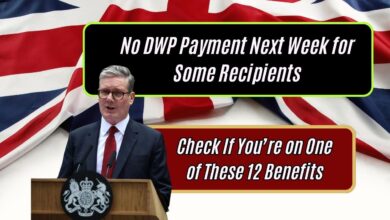Free £90 Cost of Living Payment Available This May 2025; Check If You Qualify
Free £90 Cost of Living Payment Available This May 2025 – If you’ve been feeling the financial pinch lately—sky-high grocery bills, utility payments that make you flinch, or just the struggle of stretching every dollar (or pound) to the max—there’s some good news coming your way. A Free £90 Cost of Living Payment is being made available this May 2025 through local councils under the UK’s Household Support Fund (HSF). It ain’t a government-wide DWP payment this time, but yep, help is still out there—you just gotta know where to look.

Let’s break it all down like your favorite neighborhood guide—clear, real, and to-the-point. Whether you’re retired, working part-time, on benefits, or just trying to make ends meet, you may qualify for this free cash support. And the best part? It doesn’t need to be paid back. Sound like something you—or someone you know—could use? Stick around, we’re digging deep into how it works, who gets it, and how to snag your slice before it runs out.
Free £90 Cost of Living Payment Available This May 2025
| Details | Information |
|---|---|
| Payment Name | Household Support Fund (HSF) Payment |
| Amount | £90 (in most local councils) |
| Eligibility | Varies by council, includes those on Housing Benefit, Council Tax Support, or Free School Meals |
| Application Mode | Online via local council websites |
| Distribution Timeline | May 2025 (specific dates vary) |
| Authority | Administered by local councils, funded by UK Government |
| Official Resource | Gov.UK |
The £90 Cost of Living Payment available this May 2025 may not be part of a flashy nationwide campaign, but it’s a lifeline for thousands of families dealing with financial heat. With groceries, energy, and housing costs refusing to chill out, even a small payment like this can mean real relief—whether it’s groceries for the week, help on the power bill, or school snacks for the kids.
The clock’s ticking though. Since the Household Support Fund is limited and localized, your best bet is to act now—check your council’s site, read the rules, and send in your application before the fund’s dry.
Stay sharp, stay safe from scams, and keep sharing info like this with friends and fam who might need it too. Because in times like these, we all rise together.
What’s the Deal With the £90 Payment in May 2025?
While the DWP Cost of Living Payments officially ended in early 2024, support hasn’t vanished entirely. Instead, the UK government extended the Household Support Fund (HSF)—a safety net offered via your local council. Each council receives a slice of this central funding and rolls it out in their own way, often as one-time cash payments or shopping/energy vouchers.
Right now, several councils—including Cheshire West and Chester, Nottinghamshire, Birmingham, and Kent—have confirmed a £90 (or more) payout per eligible resident or household for May 2025.
This money is not a loan, not taxable income, and definitely not something you’ll be asked to repay.
Why Is This Payment Important Now?
Inflation may have cooled a bit, but everyday expenses? Still sky-high. A simple grocery run can easily hit triple digits, and heating bills—even in spring—aren’t exactly small.
- Groceries have surged by more than 8% compared to early 2024, according to the Office for National Statistics.
- Energy bills, while capped, remain high—around £1,690 annually for the average household as per Ofgem’s 2025 energy price cap.
- Wages? Still dragging behind inflation for most low-income groups.
So yeah—£90 won’t solve everything, but it can definitely lighten the load for that week’s shopping or cover a chunk of your monthly energy bill.
How Does the Household Support Fund Work?
What It Is
The Household Support Fund (HSF) is targeted financial aid provided to local councils in England to help struggling residents with essentials—food, energy, water bills, and other necessities.
Who It Helps
Every council sets its own criteria, but broadly, it covers:
- People on Housing Benefit
- Families receiving Free School Meals
- Individuals receiving Council Tax Reduction
- Low-income pensioners
- Disabled residents or caregivers
- Sometimes even folks who are working but still under financial stress
What You Can Get?
- Cash payments (e.g., £90 directly into your bank account)
- Supermarket vouchers (Tesco, Asda, Morrisons, etc.)
- Energy bill top-ups or fuel cards
- Food packages or school holiday meal support
- White goods assistance (fridge, cooker replacement)
- Emergency rent help in some boroughs (on discretion)
How to Check If You Qualify?
Alright, now for the real tea—how do you actually get this money?
Step 1: Find Your Local Council Website
Jump onto https://www.gov.uk/find-local-council and type in your postcode. You’ll get directed to your council’s official homepage.
Step 2: Look for ‘Household Support Fund’
Almost every council has a “Cost of Living Help” or “Household Support Fund” page. Look for application forms, eligibility guidelines, and contact info.
Step 3: Apply ASAP
Many councils work on a first-come, first-served basis. That means if the funds run out before you apply—you snooze, you lose.
Some councils (like Cheshire West) are automatically sending payments to known beneficiaries (like those on Housing Benefit or FSM), but others require you to apply manually.
Examples: How Different Councils Are Paying Out?
Cheshire West and Chester
- Families with children on Free School Meals get £90 per child automatically during May half-term.
- Additional emergency support available for energy or food.
Nottinghamshire
- Low-income households can apply for a £90 cash grant.
- Help also available for fuel and water bills.
Kent County Council
- Offers energy vouchers, food aid, and white goods for low-income households.
- Applications open via community hubs.
Birmingham City Council
- Distribution through local partner organizations, especially focused on pensioners and disabled adults.
Be Aware: DWP Has Confirmed No More National Payments
Here’s where things get a little tricky: This £90 isn’t part of the usual DWP Cost of Living Payments. The last of those payments landed in early 2024, and the government has confirmed they won’t continue in 2025.
So, if you see a WhatsApp message or email claiming you’re owed a “DWP £90 Payment”—run the other way. That’s scammer territory. Stick to your local council and https://www.gov.uk/guidance/cost-of-living-payment for the real deal.
Also, report fraud attempts to Action Fraud UK if you encounter suspicious messages.
Tips to Make the Most of the £90 Payment
- Use it for essentials like groceries or utility top-ups. Avoid using it on non-critical expenses.
- Combine it with other support, like food banks or energy bill assistance programs.
- Ask about recurring help—some councils may have additional funding cycles or vouchers during school holidays or winter.
- Save documentation for your application in case you’re asked for proof later.
Are You Eligible for DWP Compensation? Critical Deadlines Every Claimant Must Know
Miss Out and You Could Lose £900: What the New DWP Eligibility Rules Mean for You
FAQs On Free £90 Cost of Living Payment Available This May 2025
Q1: Is this £90 payment from the DWP?
Nope. It’s part of the Household Support Fund, distributed through local councils, not the DWP.
Q2: Do I need to repay the £90?
Nope! It’s a grant, not a loan—you don’t owe a penny back.
Q3: Can working people apply too?
Yes, if you’re on a low income and meet your council’s criteria, you can still apply.
Q4: Can I apply on behalf of my elderly parents?
Yes, just make sure you have their permission and the correct documents.
Q5: What if my council says funds are gone?
Then unfortunately, you’re out of luck—apply early next time or ask about alternate aid programs.
Q6: Can this payment affect my benefits?
Nope. It’s not taxable and doesn’t affect Universal Credit, Pension Credit, or other benefits.







